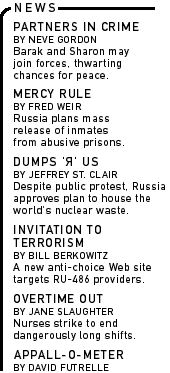

|

|

|

|
| |
|
|
|
The early reviews are in on the new George W. Bush administration. It has all the elements of the classic horror story: a predictable plot, familiar villains and an unshakable sense of déjà vu. On the following pages, we take a look at Bush's nominees and appointments, a diverse cast of characters in every way but ideology. Left to their own devices, this collection of unrepentant cold warriors, anti-choice extremists, Wise-Use desperados and corporate shills (as well as a couple of reasonable old-fashioned conservatives) could make for a harrowing next four years. Can the forces of good thwart this evil plan? Well, as In These Times went to press, thousands of townspeople were taking their torches to Washington to protest Dubya's inauguration, making one thing clear: There will be no honeymoon! Craig Aaron
Corporate agribusiness minions may well be heralding the appointment of Ann Veneman as George W. Bush's new secretary of agriculture, but the nation's family farmers should be at best wary of the choice. Regarded as a protégé of Richard Lyng, who was agriculture secretary during
Veneman has considerable experience within the USDA bureaucracy. Beginning with the USDA's Foreign Agricultural Service (FAS) in 1986, Veneman rose to deputy undersecretary for international affairs and commodity programs. She also was one of the early negotiators of NAFTA, and she served from 1991 to 1993 as the deputy undersecretary of the USDA, which at the time was the highest post at the department ever held by a woman. But her appointment is also a political reward for California's Central Valley, where Bush concentrated his California campaign and received much of his financial support. Veneman's parents were peach growers in Stanislaus County in the San Joaquin Valley south of Sacramento. Her father was a Republican state assemblyman and undersecretary of health, education and welfare in the Nixon administration. In 1995, California Gov. Pete Wilson selected Veneman to head the state's Department of Food and Agriculture. Her tenure there offers a few clues for what to expect from Veneman as head of the USDA. For instance, her agency fought hard to extend the use of the deadly chemical poison methyl bromide when the sunset clause under the Birth Defects Prevention Act required that its registration be canceled. Eventually, an extension was approved (with the support of key votes from Democrats who represent agricultural areas of the state). Veneman is a strong proponent of "free trade," believing that the "trend toward globalization is unstoppable." Between her service with the FAS, during which time she helped negotiate the Uruguay Round talks for the General Agreement on Tariffs and Trade (GATT), and her appointment in California, she worked for the influential lobbying and law firm of Patton, Boggs and Blow. Among her clients was Dole Foods Co., the world's largest producer of fruits and vegetables. She also served on the International Policy Council on Agriculture, Food and Trade with representatives from Cargill, Monsanto, Nestle, Kraft, Universal Leaf Tobacco Co., the American Farm Bureau Federation and Archer Daniels Midland. Veneman also advocates high technology's role in farming, from e-commerce to genetic engineering. She served on the board of directors of Calgene, a Davis, California company, later acquired by Monsanto, which pioneered genetically altered tomatoes. As she told an agricultural biotechnology conference last year: "We simply will not be able to feed the world without biotechnology." Veneman's positions are not yet known on such pressing issues as
crop price-support payments, antitrust concerns, the environmental
dangers surrounding factory farms, and the fate of the expiring
and disastrous Freedom to Farm legislation. But her views on free
trade and biotechnology, coupled with her clear pro-corporate bias,
make Veneman an enigmatic, if not pernicious force, when it comes
to the immediate future of family farm agriculture. A.V. Krebs is editor and publisher of The Agribusiness Examiner, a weekly e-mail newsletter monitoring the activities of corporate agribusiness from a public interest perspective. He can be reached at avkrebs@earthlink.net.
|


